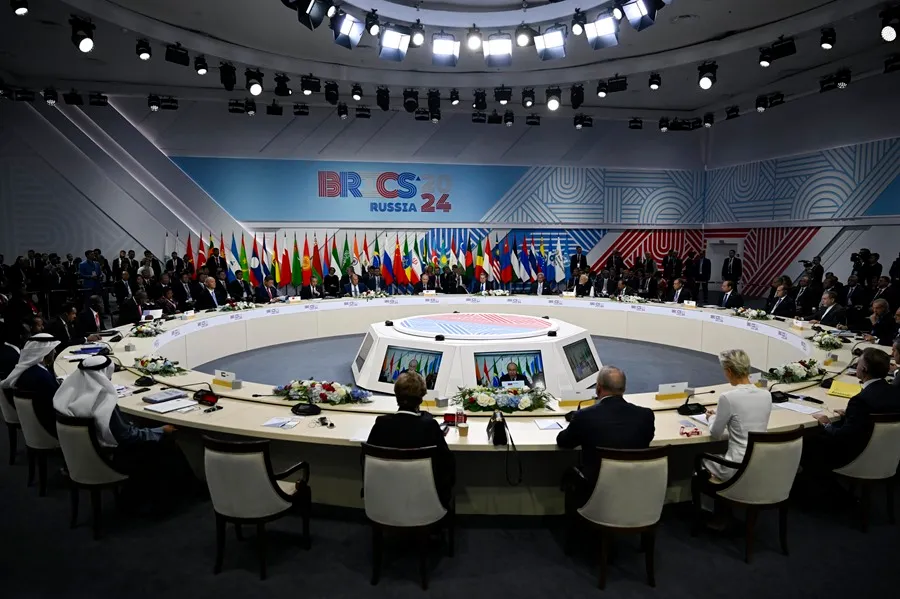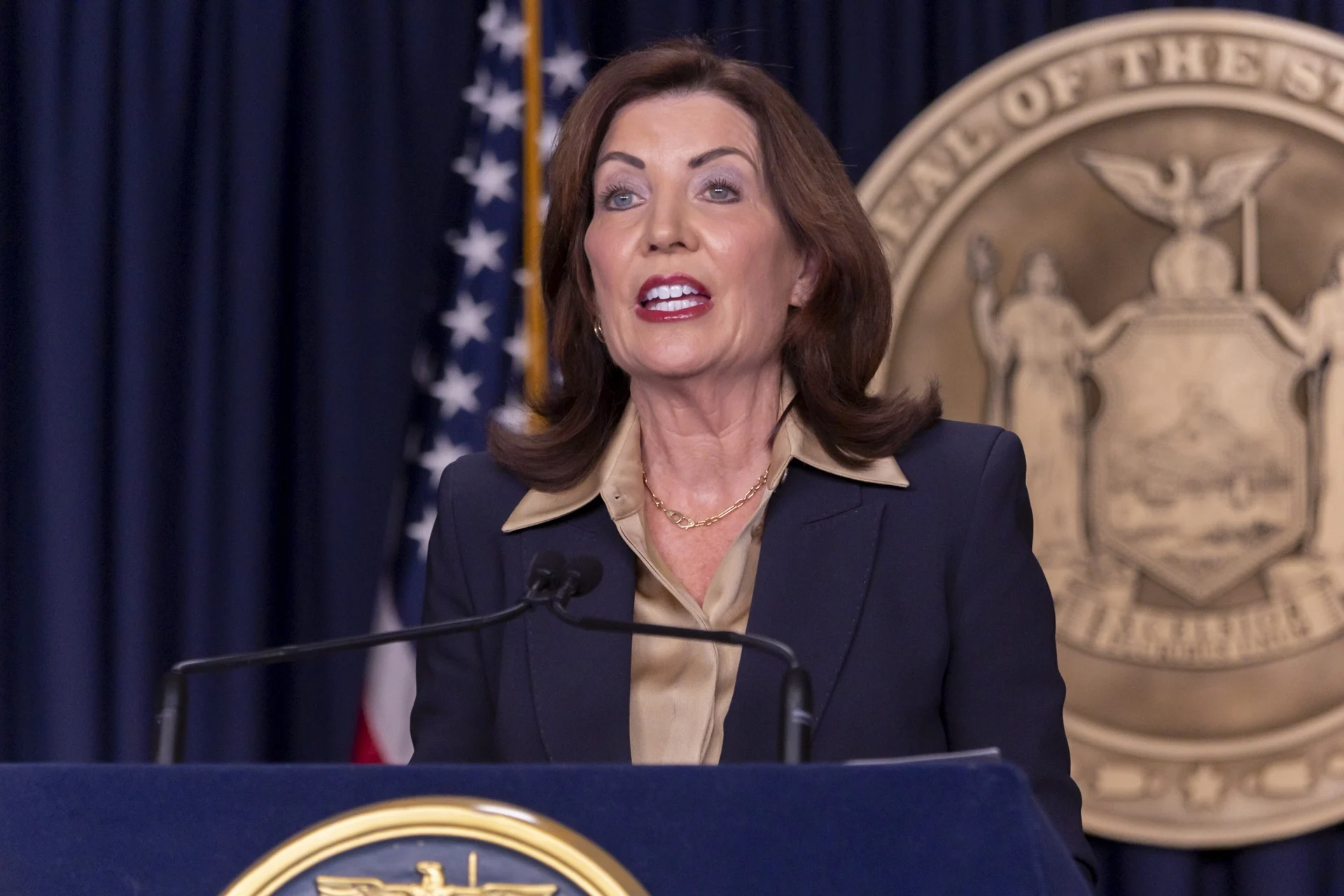International
Lula defends opening peace negotiations in the war in Ukraine during a summit with Russia

Brazilian President Luiz Inácio Lula da Silva defended “avoiding an escalation and starting peace negotiations” in the war in Ukraine during his participation, by videoconference, in the BRICS summit, which holds its plenary session this Wednesday in the Russian city of Kazan.
Luiz Inácio Lula da Silva also said that “the time has come to move forward” in the creation of an alternative payment system that allows emerging countries not to use the dollar in their exchanges.
“Avoiding an escalation and starting peace negotiations is also crucial in the conflict between Ukraine and Russia,” Lula said in the final words of his speech.
Middle East and Ukraine, at the summit
The Brazilian ruler, who together with his Chinese counterpart, Xi Jinping, promotes a peace initiative that Ukraine has already rejected, made that brief reference to the conflict on European soil after talking about the war that Israel is fighting against the Palestinian armed group Hamas and the Lebanese Hezbula.
“When we face two wars with the potential to become global, it is essential to rescue our ability to work together for common objectives,” stressed the Brazilian leader.
Lula canceled his trip to Russia on medical recommendation, after suffering a fall on Saturday at his residence, which caused a small cut on the back of his neck that required five stitches.
Xi Jinping asks for de-escalation
Chinese President Xi Jinping called for an early de-escalation in Ukraine and the cessation of hostilities in the Gaza Strip and Lebanon.
“It is necessary to contribute to a prompt de-escalation in Ukraine (…) and achieve a cessation of hostilities and murders in Gaza and Lebanon as soon as possible,” Xi said during his speech at the summit.
Jinping held a meeting in the Russian city of Kazan with Indian Prime Minister Narendra Modi, in which he asked that China and India “resolve their conflicts and differences,” in the first formal meeting that both have in four years.
Xi indicated that both China and India “are ancient civilizations, large developing countries and important members of the Global South,” according to a statement published by the Chinese state network CCTV.
Iranian president calls for a ceasefire in Palestine and Lebanon
For his part, the President of Iran, Masud Pezeshkian, “demanded” “an immediate and permanent ceasefire in Palestine and Lebanon,” on the first occasion that an Iranian president participates in a plenary session of the BRICS summit.
In addition, the Iranian president called for “the complete withdrawal of the troops of the occupying regime (Israel) from the occupied areas and immediate aid to the population of Gaza and to the displaced in Lebanon.”
Condemns Israeli bombing of Lebanon
The countries of the BRICS group condemned in the final declaration of the Kazan summit the Israeli bombings against the territory of Lebanon and against humanitarian centers in the Gaza Strip.
“We condemn the death of civilians and the enormous damage caused to civilian infrastructure as a result of Israeli attacks on civilian areas in Lebanon,” says the document released at the end of the meeting of the nine members of the BRICS in the Russian city of Kazan, a text that also condemns the Israeli attacks against centers, activities and humanitarian personnel in Gaza.
The BRICS call for an “immediate” end to hostilities in both Gaza and Lebanon.
“We highlight the need to preserve the sovereignty and territorial integrity of Lebanon and create conditions for a political-diplomatic solution in order to maintain peace and stability in the Middle East,” the text says.
The joint statement warns that “a further escalation of the conflict in the Gaza Strip threatens with increased tensions, extremism and extremely harmful consequences at the regional and global level.”
The BRICS summit
The Kazan summit is the first to be held by the emerging economies group after its expansion from five to nine members last January.
“Now, in a limited format, we propose to consider the most relevant aspects of the global agenda, to exchange views on the issue of cooperation between the BRICS States at the international level, including the resolution of acute regional conflicts,” said Russian President Vladimir Putin, at the opening of the meeting.
Once the meeting is concluded in a small format, the BRICS countries – Brazil, Russia, India, China, South Africa, Iran, Egypt, the United Arab Emirates and Ethiopia – will sit down at a table with representatives of about twenty States invited to the event, including Turkey, Bolivia, Venezuela and Nicaragua.
At the end of the summit, BRICS leaders will approve a joint statement on a number of global issues, including conflict in Ukraine.
What is the BRICS group
The BRICS group, founded in 2006 and held its first summit in 2009, integrates countries with a third of the world economy and more than 40% of the population.
Analysts point out that with this summit Putin tries to show the world that Russia is not as isolated as the West intends, while paving the way for the forging of a new world majority that challenges the hegemony of the United States.
Putin and Maduro will meet today on the sidelines of the summit
Vladimir Putin will also meet with his Venezuelan counterpart, Nicolás Maduro, who arrived this Tuesday in the Russian city of Kazan to participate in the XVI Summit of the BRICS emerging economy group to which the country intends to join, the Kremlin reported.
The Kremlin’s advisor for International Affairs, Yuri Ushakov, added that Putin and Maduro will talk about “bilateral affairs and cooperation within the framework of the BRICS.”
International
New York Announces First 2,000 Seats in Universal 2-K Program

The Governor of New York, Kathy Hochul, and New York City Mayor Zohran Mamdani took another step today in their universal early education agenda by announcing the communities that will have access to the first 2,000 seats in the new 2-K program this fall — an initiative backed by a $73 million investment.
The funding is part of the $1.2 billion package previously unveiled by Hochul to strengthen child care and early childhood education across the city, one of the key campaign promises of the now Social Democratic mayor.
At the time of the announcement, the governor also outlined additional funds to reinforce the existing 3-K early education infrastructure, a program launched under former Mayor Bill de Blasio (2014–2021).
When the 2-K initiative was introduced in January, Mayor Mamdani explained that its first phase would offer 2,000 seats, with the goal of eventually expanding into a universal program — a commitment supported by the governor.
State investment in child care and preschool services is expected to increase to $4.5 billion by fiscal year 2027.
Among the first communities set to benefit from the 2,000 seats are Upper Manhattan and Inwood — areas with large Dominican populations — as well as Fordham and Kingsbridge in the Bronx, a borough with a Latino majority.
In East Brooklyn, Canarsie, Brownsville, and Ocean Hill will also be included. Meanwhile, Ozone Park and the Rockaways are among the neighborhoods that will see the rollout of the 2-K program.
International
Warner Bros. Developing First ‘Game of Thrones’ Movie With ‘Andor’ Writer

Warner Bros. is developing the first feature film based on the hit saga Game of Thrones, with Beau Willimon — screenwriter of Andor — attached to direct, according to a report published Tuesday by Page Six.
The project, currently in early development, will focus on the conquest of King Aegon I Targaryen. A separate television adaptation centered on the same historical storyline within the franchise is also in early stages at HBO.
However, the outlet noted that it remains unclear whether the film will move forward following the recent acquisition of Warner Bros. Discovery by Paramount Skydance.
If the merger is finalized, the movie could potentially be shelved, although that scenario appears unlikely given that the Game of Thrones franchise remains one of HBO’s most valuable and beloved properties.
After six seasons adapting the work of George R. R. Martin, the platform expanded the universe with House of the Dragon, a prequel series set 200 years before the events of Game of Thrones that explores the history of House Targaryen.
International
Spain’s Prime Minister to Address Nation Amid Trump’s Trade Threats

The Prime Minister of Spain, Pedro Sánchez, will deliver an institutional address this Wednesday at the Moncloa Palace regarding the escalating situation in the Middle East and recent threats directed at Spain by U.S. President Donald Trump.
The Spanish government announced that Sánchez will make a statement at 9:00 a.m. local time to outline his position on the latest developments following the U.S. and Israeli attacks on Iran.
Sánchez is expected to reiterate Spain’s reasons for opposing the use of U.S. military bases on Spanish soil in the operation—an action he has already described as being outside international law—while also expressing criticism of the Iranian regime.
Government sources indicated that the address had been planned prior to Trump’s remarks criticizing Spain’s stance. However, following those comments, Sánchez is now also expected to respond directly to the U.S. president’s statements.
Trump has threatened to “cut all trade with Spain” and said he wants “nothing to do” with the country after Madrid refused to authorize the use of the Morón and Rota military bases in southern Spain for operations against Tehran.
The U.S. president also labeled Spain “a terrible NATO partner” and warned that “no one” would tell him he could not use the facilities.
In response, the Spanish government stated that Spain fulfills its commitments to NATO and European defense. It also warned Trump that any review of bilateral trade relations must respect international law and the agreements in place between the European Union and the United States.
-

 International2 days ago
International2 days agoIran Reports 201 Dead, 747 Injured After U.S. and Israeli Strikes
-

 International2 days ago
International2 days agoPope Leo XIV Urges End to ‘Spiral of Violence’ in Middle East
-

 International4 days ago
International4 days agoTrump Floats “Friendly Takeover” of Cuba Amid Rising Tensions
-

 Sin categoría3 days ago
Sin categoría3 days agoTrump: ‘We Think It’s True’ Amid Claims Iran’s Supreme Leader Was Killed
-

 International3 days ago
International3 days agoSecurity Council to Hold Emergency Meeting on Middle East Crisis
-

 International1 day ago
International1 day agoBrazil’s Supreme Court Rejects Bolsonaro’s Bid for House Arrest
-

 International4 days ago
International4 days agoArgentina’s Senate Reviews Milei-Backed Labor Overhaul
-

 International1 day ago
International1 day agoAnti-ICE Billboard Campaign Targets Immigration Spending in 31 U.S. Cities
-

 International1 day ago
International1 day agoTrump Warns of ‘Major Wave’ of Attacks as Iran Conflict Escalates
-

 International1 day ago
International1 day agoMexico Calls for Immediate Probe After National Dies in ICE Custody
-

 International9 hours ago
International9 hours agoNew York Announces First 2,000 Seats in Universal 2-K Program
-

 Central America1 day ago
Central America1 day agoPanama Canal Monitoring Trade as Middle East Conflict Disrupts Shipping
-

 International1 day ago
International1 day agoBolivia Orders Three Investigations Into Deadly Military Plane Crash
-

 International9 hours ago
International9 hours agoSpain’s Prime Minister to Address Nation Amid Trump’s Trade Threats
-

 Central America9 hours ago
Central America9 hours agoGuatemala’s Attorney General Fails in Bid for Top Court Seat Amid Corruption Allegations
-

 International9 hours ago
International9 hours agoWarner Bros. Developing First ‘Game of Thrones’ Movie With ‘Andor’ Writer




























